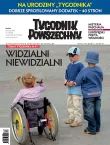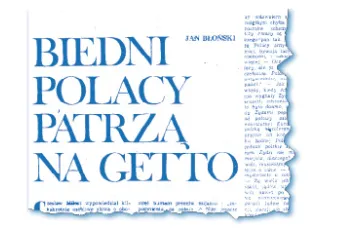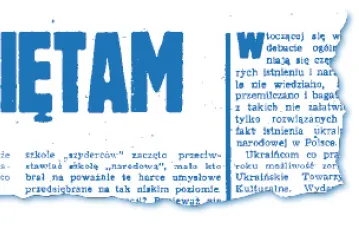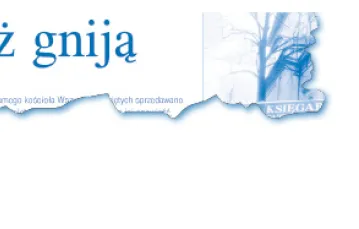Wykupienie dostępu pozwoli Ci czytać artykuły wysokiej jakości i wspierać niezależne dziennikarstwo w wymagających dla wydawców czasach. Rośnij z nami! Pełna oferta →
This interview appeared in Tygodnik Powszechny No. 46/99. Marek Edelman also recounted the Ghetto Uprising to Anna Guzik, Witold Bereś, Krzysztof Burnetko, and Tomasz Fiałkowski in Tygodnik Powszechny No. 16/93; the author of the interview discussed the reasons why Edelman was not well-liked in Israel in “Bohater wybrany" [A chosen hero], Tygodnik Powszechny No. 12/06. The books referred to in the interview are Hanna Krall, Shielding the Flame, Marek Edelman, The Ghetto Fights, and Cywia Lubetkin, In the Days of Destruction and Revolt. Mordechaj Anielewicz, Antek (Icchak) Cukierman, Celina (Cywia) Lubetkin, Masza Putermilch, Jurek Wilner, Kazik (Simcha) Rotem, Stasia Rozensztajn Starker, and Inka Świdowska were soldiers and liaison officers of the Jewish Combat Organisation. Icchak Cukierman and Cywia Lubetkin emigrated to Israel after the war and died there; they lived in the Lohamei HaGeta’ot kibbutz. Estera Iwińska (1886-1963), sister of Bund leader Wiktor Alter, was held hostage in September 1939 together with the president of Warsaw Stefan Starzyński; she escaped and managed to reach the US; after the war, she lived in Brussels. Adam Czerniaków was head of the Judenrat in the Warsaw Ghetto; he committed suicide on 23 July 1942 following German demands that he collaborate in organising deportations. Chaim Rumkowski held an analogous post in the Łódź Ghetto, which was the only one to survive until 1944, but at the price of the extensive collaboration of the Judenrat with the Germans; he died in Auschwitz in 1944. Shlichim (Hebrew) - emissaries; Aliyah (Hebrew) - immigration [of Jews to the Land of Israel]. An extended version of this interview was published in Anka Grupińska, Ciągle po kole, Warsaw 2000.
Anka Grupińska: When I first visited the Lohamei HaGeta’ot (Ghetto Fighters) kibbutz in 1988 and read them my interview with you, they attacked me vehemently. It was only when an elderly grey-haired lady stood up and asked with astonished indignation “What exactly is Marek’s point - does he want to become the Christ of all Poles?" that I understood the reasons for their anger. Are you happy with the role history has destined you to play in Poland?
Marek Edelman: Look, what I have in common with many people in this country is a certain way of thinking about life. Nationalism plays no part in it. The chosen people or the chosen land have no place in my thinking. You must respect every life and that is all. There’s no need for any myth-making here.
But a myth has already been born. Whether you like it or not, it’s there. Marek, do you realise the immense impact Hania Krall’s book has had here in Poland? In conversations, you tend to underestimate it. It was thanks to this book that you became known to many people. And another thing - this book has, in a sense, created your image.
I think it rather created Hania’s image.
In a different sense, though.
You know, Hania’s a genius. She can remember every word like no one else can. I wasn’t always happy with her punchlines, but... Well, it doesn’t matter. I said nothing new in it.
I said everything in The Ghetto Fights.
This book is unique not because it reveals new historical facts. On the contrary, the reader learns that those facts, meticulously recounted, are actually not that valuable. It is unique, however, because it creates an image of you that has come to be cherished by a certain generation: an heroic anti-hero, the most honest of cynics, a sensitive iconoclast... Through this text, we can hear you speak.
How do you know Hania created this image? She created nothing at all! She just reproduced what she heard.
So, it was you who was the great creator? That’s what you were before Hania told your story and you still are, right?
Yes, certainly.
In that case, this is a really great book.
Yes, Hania certainly knew how to get publicity.
Here’s a quote from Ben Gurion in 1942: “They did not want to listen to us. Through their death they sabotaged the Zionist idea." And he goes on to say, “The tragedy that befell European Jewry does not concern me directly." What do you say to this?
Well, you know, Ben Gurion was just a provincial smart alec. He had no vision at all. There is no doubt that the entire situation here was somehow convenient for Ben Gurion. At the time, they thought that the worse things were here, the better things would be for them there. They didn’t come to Poland; they didn’t want to send us money. They didn’t want to help us.
There never was any financial assistance from Palestine?
Never. The Home Army and the Polish government-in-exile in London helped a bit. But Schwarzbart? What a great Zionist he was! He didn’t lift a finger to help us. Antek wrote him a letter, “We will curse you and your children for three generations." Just like it is written in the Bible. And nothing happened! That letter, I remember, was written in August or September 1943 at No. 4 Komitetowa Street! He must have received it. I can’t be sure, but Karski may have taken it. And what about later, when Antek and Celina went there?
For many years in Israel not a single kind word was said about what had happened here. They would say: we are the Jewish nation because we fight the Arabs, and they - they just let themselves be slaughtered. And in fact, to this day, these new Jews only pay attention to themselves. They have dissociated
themselves from European Jews and pretend that they can build their own culture. They have erased centuries of glorious history.
Do you bear them a deep grudge about this?
Look, I think that some of it could have been salvaged, but they didn’t want to. So now, they write in a language without tradition and don’t even remember what they once had. Jews were Europeans, but Israel’s culture will be Arabic. I have nothing against this, but it doesn’t have much in common with Jewry anymore. Jewry was in Europe!
I wonder what you have to say about Celina’s book.
I can imagine what she wrote.
Celina says, for instance, that it would have been difficult to survive in the Ghetto had it not been for the thought that there were comrades in Palestine.
Ah, rubbish! Who in the Ghetto thought about comrades in Palestine?! But I know she said this at a trade union convention in 1946 or 47 - she had to say it!
Celina’s book is full of pathos.
Well, that’s because she wrote it for others, but she certainly had a mind of her own, Celina did.
Were Celina, Antek, and others such fervent Zionists before it all happened? Or was it something of an afterthought?
During the war, Zionism played no role whatsoever. In 1939, Palestine was a chance to escape, but you had to get Mussolini’s permission, like the Rabbi of Ger did. If truth be sold, all the Zionists hated Schwarzbart and the Zionists from Palestine. Later, when those Shlichim arrived, they simply tagged along. Antek was the boss here, since he had connections. He helped organise this Aliyah. He had some friends at the Ministry of Foreign Affairs, like Zarzycki and Jóźwiak. I can’t remember how many dollars you had to pay back then for a Jew to be allowed across the border.
Were you surprised by their post-war involvement in Zionism?
Not at all, we laughed about it together. Anyway, Antek didn’t emigrate immediately, only after three years. Celina did emigrate, but returned even faster. She slept on this bed here for three months. She was pregnant at the time.
From your various statements I understand that you felt a bit abandoned and lonely when they finally left.
I never said that.
OK, that’s my interpretation. But you did write that you didn’t know what to do with yourself.
And you think they did?! Later, in Israel, they were all in the background - Antek, Celina, and Kazik, too.
But Antek and Celina were surely less lonely living in the kibbutz than Kazik was in Jerusalem?
I don’t know. I don’t think any of them were particularly successful. And it’s no coincidence. This was a continuation of Israel’s wartime policy: we are the only army and we are the only ones who merit attention.
Did you have any disputes with Antek about their post-war interpretation of the Uprising?
He never said anything like that to my face.
But he did say it publicly.
Well, yes. But I have to tell you one thing: there were no such party differences within the JCO [Jewish Combat Organisation] as a whole, except for Masza, who still detests Anielewicz.
But they definitely surfaced after the war, right?
Yes, because those who emigrated wanted to show to Israel that they were the best, yet we didn’t exist at all.
And were angry about that?
No, I laughed about it. I said to Antek: “So you did everything yourselves, is that right?! Without the Bund, would you have been able to contact the Home Army?! Without me, would you have been able to contact the Home Army?! Who would have talked to you?!" “What about Jurek?!," Antek shouted. What about him? Jurek couldn’t get through.
Was it easy for you to get through?
I knew them. It wasn’t because of me, but because of my reputation.
The reputation of a Bund activist?
Well, yes. Those conversations with Antek were not serious political disputes. He laughed, I laughed, and that was that.
You cut short your first visit to Israel in the 1950s by a few days. Why?
Because Antek was getting on my nerves. He took me for a three-day tour of Israel. We saw everything: the Dead Sea, the desert, etc. I liked it a lot. When we returned to the kibbutz, he asked, “So how did you like it?" “Really beautiful," I said. “But what did you like the most?" “Landscapes and nature,"
I answered. “Didn’t you see the factories?" “There are bigger ones in Poland." “But these were built by Jews!" “So what?" Finally, he said, “You have a duty to remain here!" “Kiss my ar**,
" I said, and slammed the door. The next day Antek came to the airport and wanted to give me chocolate. I don’t like chocolate. “Leave me alone," I said.
I heard that when they criticized you severely for those gills that Anielewicz used to paint, Antek defended you fiercely.
Well, on that issue he had to defend me, because it was he who told me about it.
When we spoke fifteen years ago, you said some very strong things against Israel; you said that, as a nation, it didn’t stand a chance in a sea of 100 million Arabs.
Because it doesn’t stand a chance given Israel’s hostile politics!
Well, there has been a fundamental change - more and more Israelis think that a compromise is needed in order to coexist.
Fifty years of provincial politicking have done them no good at all. But there is another thing I talked about at the time. There is no chance for a European Jewish state - they will become Arabised.
It is already largely an Arab state.
Well, then it has already happened. I talked about this. But will this Arabised Jewish state be successful?
I don’t know. It depends on international relations, on American policy, on Islamic fundamentalism; there is the issue of Jerusalem and so on. And, at the same time, this is a nation-state, a religious state in which a Christian is a second-class citizen and a Muslim a third-class citizen. It’s a disaster. After three million people were murdered here, they want to dominate and ignore anyone who isn’t a Jew?! Secular politicians succumb to pressure from religious groups. Such a state is good for no one.
Could you tell us something nice about Anielewicz to balance this image of red-painted gills?
But there was nothing wrong with that!
You know very well that many people held it against you. There were only a few who treated it as a human story, devoid of pathos.
That’s exactly how it was. The family was hungry and the mother wanted to earn a living, so she painted the gills [to make the fish appear more fresh - trans].
But still you offended patriotic, national and other sensitivities.
Why? Because painting gills isn’t allowed?
Tell us something else about Anielewicz. Did you know him well?
I knew him for half a year, from November to May. I was with him every day.
Did you like him?
I don’t remember... I don’t remember! We operated differently. He was unpredictable. Antek and I were on one side, and Anielewicz with that other guy... what was he called?
Berliński?
...with Berliński were on the other side.
In what way were they unpredictable?
Well, you know what he did, don’t you? He went out into the street, shot a Werkschutz officer dead, and 250 or 300 people were later killed in reprisal. He killed the Werkschutz man in the morning and took his revolver; at three or four in the afternoon, the Germans came and murdered everyone, the whole street. He was irresponsible because he had never experienced displacement. He came to Warsaw from Będzin and thought he could do whatever he wanted. After the Werkschutz affair, the Coordination Committee demanded that he be removed from his post.
When did the Werkschutz affair take place?
In March or April. But Anielewicz had a fighting spirit and was intelligent. The problem was that he lacked judgement.
Anielewicz once attacked the Germans with his bare hands.
Exactly. I told you he was crazy.
And he refused to be carted off to Umschlagplatz?
That’s right, that was on 19 January.
Marek, you crossed to the Aryan side every day. You carried blood for testing.
Yes, I did, for a year or so.
Did you also carry patients’ records?
Yes, I took them to the city’s chief physician.
Did you like those occasions? Or were you slightly afraid?
Well, I was legal, wasn’t I? They could beat me up, but they couldn’t do anything more to me. I carried blood and ran other errands as well.
What errands?
Well, I carried blood, but also pamphlets. I got them from Kozia Street, from Rafał Praga’s wife. I also got them from other places, but I can’t for the life of me remember where.
What else did you do?
Look, I don’t remember any more. I made contacts. A meeting with Pużak here, a message to be delivered there - various things went on. Nothing out of the ordinary though. There was an address and you had to deliver or pick up a note or talk to someone. But everything took ages because I had to go on foot. I didn’t drive a car.
Where were your pamphlets printed? Do you remember?
Of course, I printed them myself. One print shop was at No. 67 Miła Street, and another was at 36 or 38 Nowolipie Street; those were the two main ones.
Who else did the printing?
Stasia did. There was also a boy called Zyferman and two girls. One of them was called Blumka, I think. Stasia did the mastheads.
Marek, will you tell about little Elżunia?
I’ll tell you everything.
Elżunia, Zygmunt Frydrych’s daughter, was in a convent in southern Poland, in Przemyśl.
I think it was Inka who brought her from there. Elżunia lived at No. 5 Krochmalna Street. The man who was looking after her later died in the Warsaw Uprising. He had his leg in a cast, so they couldn’t take him into the sewers; the Germans shot him and then burned him. Elżunia was later in Pruszków; there was this field where people would come to look at the children and take their pick. A miller took Elżunia to herd geese. Then, it turned cold and the miller treated her very badly. A lady from Żyrardów came by and saw that the child was freezing, so she took her away. Her husband repaired bicycles.
How old was Elżunia at the time?
I don’t remember exactly. Maybe six, seven, or eight?
Were you in contact with her at the time?
No, not at all! There was no contact from the moment the Uprising broke out in August. Elżunia used to read fairy tales to the lady to help her get to sleep. She was her favourite daughter and everything was fantastic. Then, the war ended, and because Zygmunt had told me to find his daughter, I started looking for her. When I arrived in a big car with an American flag on it, some children started shouting, “Run Elżunia, some Jews have come to get you!" When I came a second time, the lady said she could not bear to be parted from Elżunia. Finally, she let her go for a certain amount of dollars. I brought Elżunia to Warsaw. That’s how it was.
But Elżunia’s story doesn’t end there, does it?
After the Kielce pogrom, Estera Iwińska said to me, “You have no right to take responsibility for her," and she took Elżunia to Sweden where she was adopted by an American woman. In America, Elżunia had a bicycle, a pony, and a boat. She graduated, got married, and then committed suicide. She poisoned herself.
Did you think it was a good decision to send her out of Poland?
Ms Iwińska said that I could not take responsibility for someone else’s children.
In extreme circumstances, you can choose between two opposing stances; one could be called the Czerniaków stance, and the other - the JCO stance. The former is an attitude of compromise crowned with tragic resignation. The latter is, in fact, an attitude of a madman. From time to time, we wonder why history proves madmen right.
Just like us, Czerniaków was well aware that all was lost. In a hopeless situation, you have to show strong character. You have to show that you are able to reject the extreme circumstances. And although Czerniaków was able to turn Rumkowski down, he didn’t last until the end.
But judgements differ. Today, Mostowicz says that Rumkowski did the right thing because he saved a number of Jews who did not perish during the Death March. This is amazing - you are ready to accept responsibility and kill people because maybe ten out of a hundred will survive... If this is morality, well, then there is nothing we can do.
From the point of view of history, it makes no difference whether those ten survive. An individual human being is something entirely different - when you see them lying on a white sheet, etc., etc. But a mass of people...
They are individual human beings as well.
You know what happened in the Piotrków Ghetto? When ordered to select people to be killed, they abandoned the entire operation and came to Warsaw. “Kill yourselves, I don’t have to kill," they said. And Rumkowski would kill people.
So Czerniaków’s attitude was different from Rumkowski’s because Czerniaków did not want to send people to their deaths.
You know, he had a different mindset. He was a bourgeois senator, an engineer. He was unable to fight.
And he was also unable to adopt a different attitude. Zygielbojm didn’t fight either.
Their deaths were different, too; one displayed weakness, the other - protest.
Why does history usually prove madmen right? Why are there monuments to Anielewicz and none to Czerniaków?
Because Czerniaków offered bars of chocolate to dying children and you don’t get put on a pedestal for that!
Don’t you blame the world for the way it works, distributing chocolate and oblivion like that?
No, because this rule guarantees us a certain freedom.
You mean it gives you the ability to avoid being put over a barrel?
Yes, more or less. And Czerniaków did let himself be put over a barrel.
And you have no doubts about this?
None.
He committed suicide, but maybe this can be interpreted as an act of opposition - a courageous act, in a sense?
No, I don’t think so. He squandered his chance. I’ve spoken about this a hundred times. He had immense authority and could say: don’t give in, gentlemen, we must fight! We were nameless people, and he could at the least strengthen passive resistance. But he did nothing. He disliked the underground, the pamphlets they brought him. He was afraid of it all.
Marek, you have two splendid lives in one: in the Ghetto and on the “Aryan" side. First a brave soldier and then a brilliant doctor.
It was because I had good ideas.
So, you had great ideas twice. Twice you had better ideas than others did. And, on top of those two realities, you are a decent man. Was God kinder to you than to others?
I don’t know whether God should take credit for this but, in the end, it all boils down to one thing. The second stems from the first, and the third from the second. You need a bit of courage to swim against the tide.
I did the same in both cases - always against the tide. You had to convince people to go with you. And I did that. But I made mistakes, too.
What mistakes?
I underestimated human capabilities. I went too far.
During the Uprising?
Oh, come on. You won’t understand the first thing about the Uprising.
Can anyone who wasn’t there understand?
Sometimes those who don’t ask questions and just listen do understand. But you want to know more. Well, it’s impossible to know more. It’s not that you want to know something and I’m supposed to tell you. I just don’t want to say anything more. I can’t - and I don’t want to - talk about everything.
Still, the question relates to things you’ve agreed to talk about. I - like others - am trying to get to the heart of the matter, but can’t seem to get any closer.
Look, if you were my lover and were lying in bed listening to what I am saying, it might be different. In order to learn something, you have to be very close to someone. You are a journalist who wants to learn something from a disgusting Jew.
You speak to dozens of journalists...
Yes, and they’ve learnt nothing.
Why do you talk to us? Why do you keep answering the same questions?
Where’s the harm in it?! A woman or a guy sits here and talks for hours on end. Me? I don’t deceive them. Have I deceived you?
I wonder why you are really doing this.
See how friendly I am. I talk in such a way that everyone thinks they understand.
So you tell them half-truths?
No, I tell the whole truth, just not to the end. One can’t know everything. You can’t and neither can they. I don’t begrudge anyone for this. You can’t explain it all to a stranger.
It’s not just a question of distance or closeness, but of time as well. I come from a world 50 years down the line...
Both matter.
Marek, please tell me whether in your post-ghetto years you met someone who hadn’t been there and...
...yes, yes, yes...
...who hadn’t experienced what you did...
...yes, yes, yes...
...and yet, you had a 100 percent understanding with them...
...yes, yes, yes...
...and there were no barriers.
Of course! A beautiful girl. Passionate in everything she did. She pushed me because I lacked ambition. I lacked commitment. She was committed all her life. You are not committed. You just want to write a book. Do you understand what I’m saying?
To some extent, but not everything.
Exactly. You have to put your entire faith in the other person. That’s when brilliant things happen.
You’re talking about love now.
No, not about love. That’s right, about love. I’m talking about various things. Not only about the ghetto. About everything. You have to be able to jump on the roof once again. Always. Had it not been for her and two other girls, I wouldn’t have done any of this. They pushed me: go on, go on! They could think about another human being’s life in the way that I did. Imagine there’s a guy who’s dying. They want to save him, but you need commitment to do that. And commitment implies risk. Girls of 25 are unable to take such risks. They would need guns. I wasn’t afraid of commitment and they took my lead. After six months or a year, they were like me and we were together. You know, all this boils down to the same thing. That one guy today is the 400,000 people back then. You’re not able immerse yourself in all this, in me. And that’s because you don’t want to.
You’re right, I can’t. Are you very tired?
No. I can die...
Interview by Anka Grupińska
Marek Edelman (1919-2009) was a member of the Bund, a co-founder of the Jewish Combat Organisation, and one of the leaders of the Warsaw Ghetto Uprising. After the war, he was an eminent cardiologist. He collaborated with the Workers’ Defence Committee and became a member of Solidarity. In 1998, he was awarded the Order of the White Eagle.







